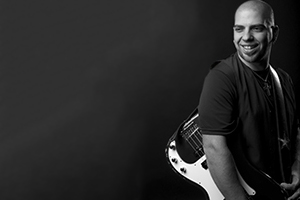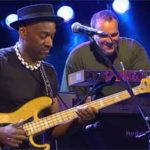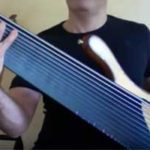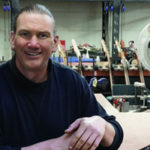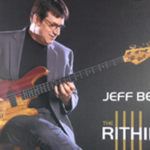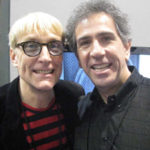Nashville bassist tells of the gigs with Raul Malo, the Mavericks and his own Hank Sinatra Band
Exclusive interview with FBPO’s Jon Liebman
October 30, 2017
Elio Giordano is a much sought-after bassist and vocalist who has performed and/or recorded with a long list music luminaries, including Raul Malo, the Mavericks, Tanya Tucker, Ronnie Dunn, Collin Raye, Easton Corbin, Bekka Bramlette and countless others. Currently based in Nashville, Giordano is well versed in many country formats, including bluegrass, rock, blues and swing, as well as Cuban and Latin American rhythms. While not playing sessions for any of a number of Grammy-winning artists, doing his radio gig or working with aspiring up-and-comers, Elio fronts his own group, Elio and the Hank Sinatra Band. We recently caught up with Elio to talk career highlights, gear, current projects and more.
FBPO: You’ve definitely got some country in you. Where are you from?
EG: I was born in Connecticut and lived there till I was about 13 years old, then moved to Maine and stayed there until 1995. Then I moved to Nashville.
FBPO: How’d you get mixed up in the music business and the bass world?
EG: My dad was a musician, just for fun, but my brother was a musician and they had a little jam band. He and his friends would get together. I was real little. They never had a bass player and I just ended up playing bass. I started out as a trumpet player, then I ended up playing bass with them. It led to all kinds of Nashville stuff. I’ve been fronting bands since I was 14 years old.
FBPO: So you started with electric bass or upright bass?
EG: Electric.
FBPO: What kinds of music were you first exposed to when you were growing up?
EG: My father was a classic country fan, Ray Price and Buck Owens and those types of artists, so I was steeped in that music from an early age, George Jones, Conway Twitty, all the old stuff, you know. Then the ‘80s country kind of rolled around, and Dwight Yoakam came out, things like that. I got more into that. Of course we did the rock thing when we were young, played classic rock, played with the school bands and garage bands, talent shows. My parents bought a campground up in Maine and we ended up playing at the campground. People loved it and we toured all over New England, Canada, and came all the way down to Nashville.
FBPO: Which bass players influenced you the most?
EG: Well, when I was a kid, it was all Geddy Lee and Steve Harris. Then as I got older it became Paul McCartney. I like a lot of swing music, I like Jaco, James Jamerson, Bob Babbitt. Funky stuff.
FBPO: At what point did you pick up the upright bass?
EG: That was about 12 years ago or so. I saw it and fell in love with it. I always liked it. I tried to play it when I was a kid, when I’d go to the store and it didn’t make any sense to me for whatever reason. I just bought one and said it was going to sound really bad until it doesn’t. I started bringing it to gigs and everybody’s like, “No, not the upright!” And then after a while, I got tired or playing it and everybody was, “Hey, where’s the upright?” So I said, “Okay, I get it.”
FBPO: Did you ever study classical double bass? Did you ever use the bow?
EG: No. I bow, but I never learned. I taught myself everything.
FBPO: How did your career get rolling?
EG: I started playing in bar bands in Nashville and I think somebody came in to a bar I was playing and they were looking for a bass player for Steve Azar, a country artist at the time. They liked my playing and they invited me to a rehearsal. Then, like three days later, we went out to tour 16 dates in California and Texas. It was pretty instant. I mean I’d toured with my own band. I had my own band for years that I ran. We went all over the place, but getting on a bus for the first time, that was it.
FBPO: How old were you at the time?
EG: I was 22.
FBPO: So from there, one thing led to another?
EG: Yeah. I played electric and then I played downtown a bunch. Then I saw Dave Roe play with the Don Kelley band and his upright playing just blew me away. I just sat there and watched him for days. Then we started talking and he was like, “Go get a bass!” And I did. I went home on vacation and they had one at the music store I went to and they let me pay $25 a week [laughs]. I bought a bass and Dave showed me a couple things and then, literally, after about three months, I’d play Wednesdays and Saturdays, and he’d play Thursdays and Fridays. He was out with Dwight Yoakam and, within two months after that, I played the gig full time. I played with that band for 9 years. Actually, I started with a band called Brazilbilly, then Don Kelley hired me.
FBPO: You were with the Mavericks for quite a while.
EG: Yep! I played in Raul (Malo)’s solo band for a couple years, then he said to me, “The Mavericks are getting back together and I want you to play bass.” That was like the biggest honor for me ever.
FBPO: How long did you have that gig?
EG: About 3 years. And if you count the fill-in work I did with them, it’s more like 4 or 5 years.
FBPO: What’s keeping you busy these days?
EG: I play in town with my own band, the Hank Sinatra Band. that keeps me pretty busy about five days a week. I work radio as well now. I started in the radio business originally. I quit WSM Radio to go on the road with Steve Azar. I kind of came full circle and came back to doing radio again and still play 5-6 nights a week, so not much has changed.
FBPO: Let’s talk a little bit about your bass technique. You’ve never had any formal training, so how did you figure it out?
EG: I don’t know. Honestly, I really don’t know if it’s right or wrong any more. I’m just so used to doing it. It was just kind of where my hands felt natural. I’d watch Dave a bunch and tried to mimic as much as I could, and watch other players and mimic whatever looked right or comfortable to me. It’s just how it happened. I ended up playing so much slap bass with Don. All that Brazilian music we were doing was real percussive, so that’s where all that stuff came from.
FBPO: Tell me about your gear.
EG: As far as uprights, I have a ’46 Kay, I have a new American Standard, I have a couple of King basses. I use Ashdown amps on stage. On smaller gigs I use AER amps. I used Barbera pickups on all my (upright) basses. I use Efrano European gut strings and I use a Fishman Platinum bass EQ.
FBPO: How about the electrics?
EG: I use RS guitars. They’re out of Winchester, Kentucky. They make great hand-made guitars and unbelievable hand-made basses. I’ve had endorsements with a bunch of people over the years: ESP and Schecter, Brubaker. I designed a couple guitars together with Dean. Ashdown amps. On my fretless, I use Thomastiks and I use D’Addario NYXL flatwounds on the rest of my basses, on my fretted ones.
FBPO: Tell me about the Kala U-Bass.
EG: Let me give you a little background. I started playing that with the Mavericks, and when we did Raul’s session for his record, I brought out so many basses! I brought out a ’56 P-bass, I brought out a ’64 P-bass, I brought out Jazzes. I brought out anything you can imagine. And I played that thing on every single track, the mahogany body U-Bass. Here’s what happened. I had an accident and I fell down and I hit my head on a car door, slipping on ice.
FBPO: Not in Nashville, I bet!
EG: It was in Nashville! I had damaged my neck severely and I had lost feeling from my chest to the tip of my toes and I had to have spinal surgery. I have nerve damage, so I can only feel three fingers on each hand. So the Kala bass came along, the solid body, and I could feel the strings better because they’re a little fatter and it didn’t hurt my hands every time I hit a note. So I played and played and played that thing forever. And now I’ve just developed this thumb/finger style of playing that thing. It’s not the only thing I do, but it is like the majority of what I do now. It’s amazing. That thing has like saved my life, honestly.
FBPO: What about the future?
EG: I still enjoy playing. I still go out with artists from time to time when they call. I do one-offs. I just keep writing music and playing with my band. I still experiment with different styles. I get session calls. It’s pretty much all my kids now. My kids have a band and it’s their turn now, so I’m kind of guiding them through it.
FBPO: What would you be if you weren’t a bass player?
EG: I never thought of it. I’ve been doing it so long I can hardly think of anything else.
Related posts:
[table id=1115 /]
